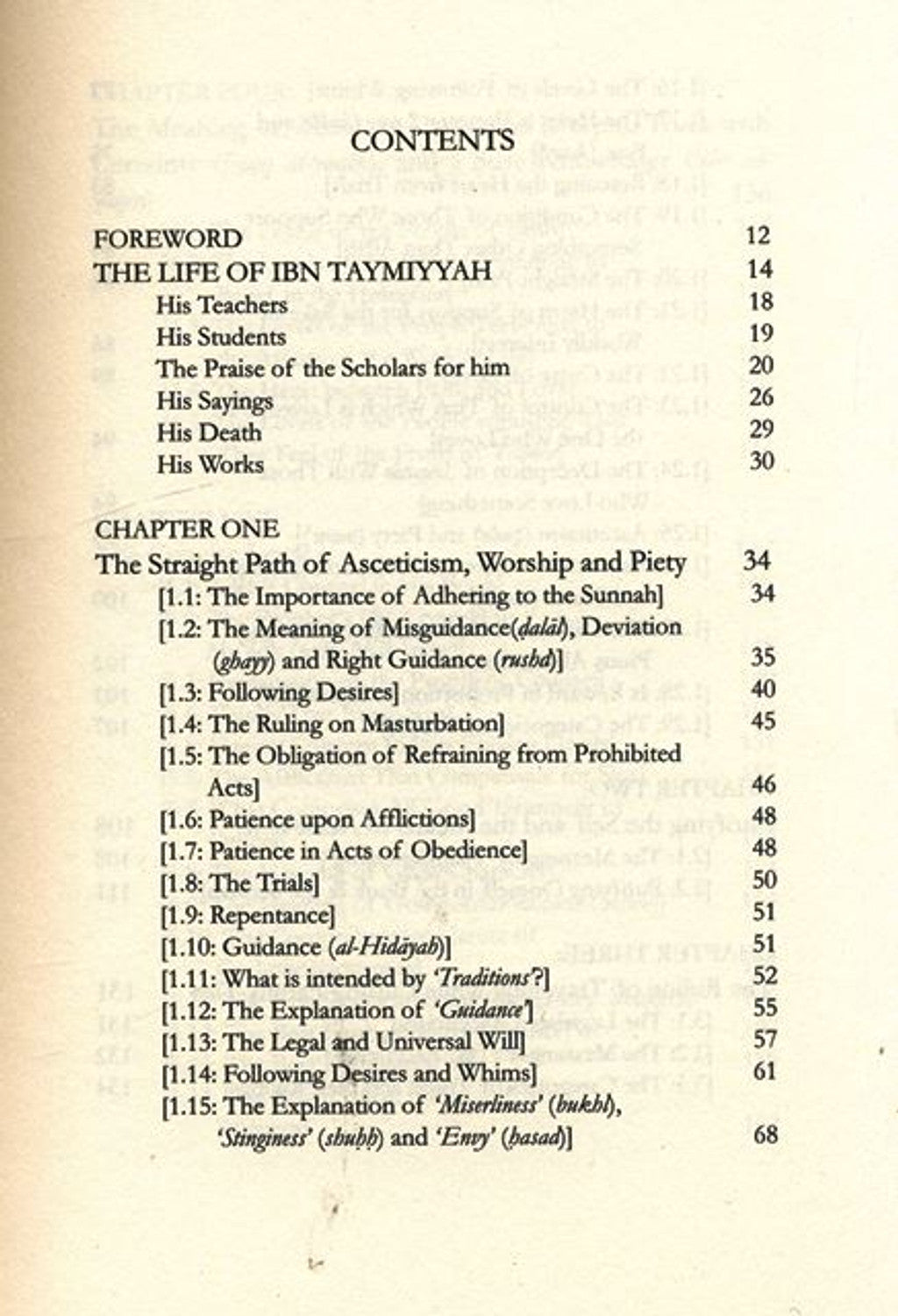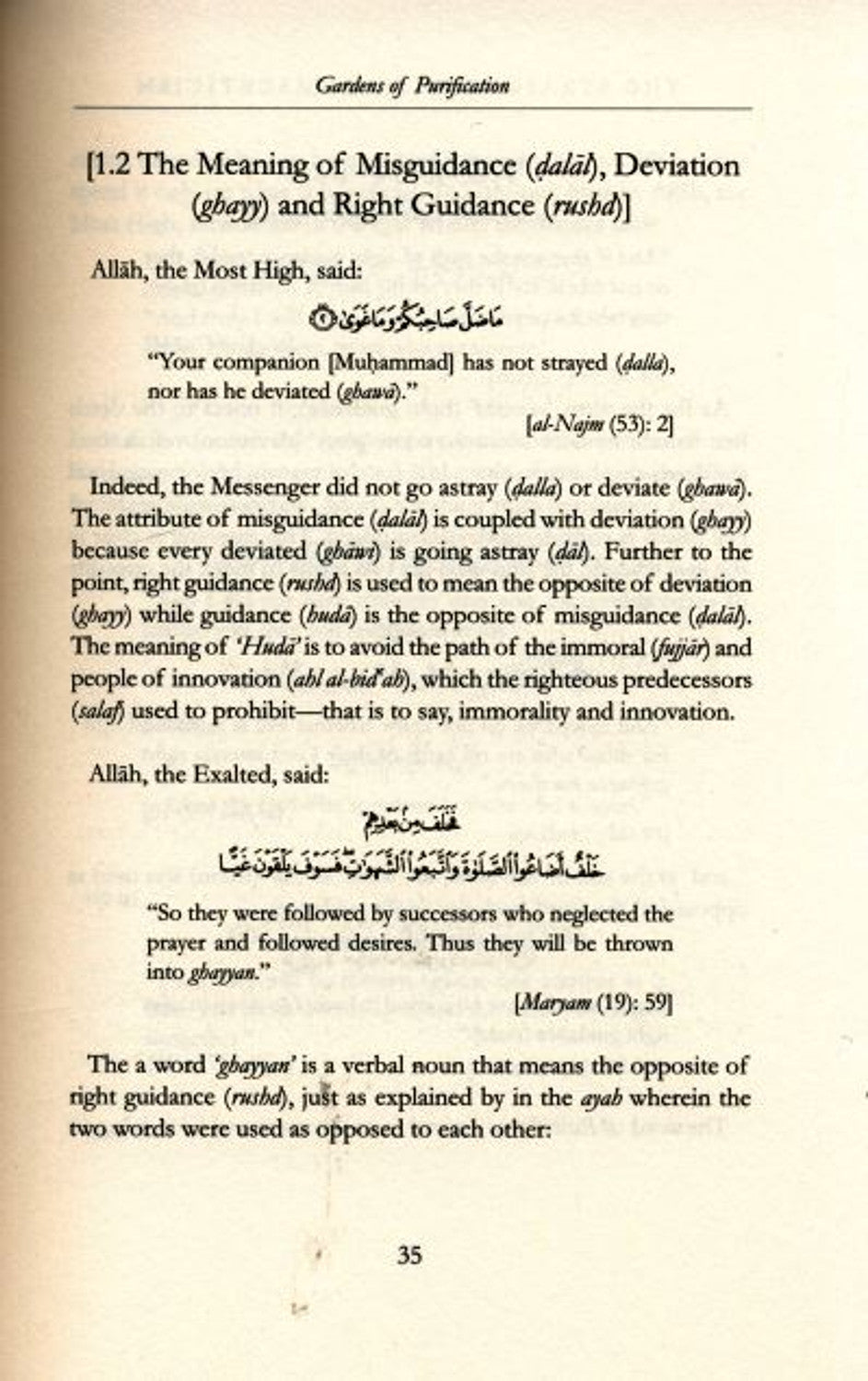Gardens of Purification By Daar Us-Sunnah
Gardens of Purification By Daar Us-Sunnah
Publisher:
Dar As Sunnah Publications
Author:
Shaykhul-Islam Ibn Taymiyyah
Language:
English
Binding:
Soft Cover
Pages: 336
Size: A5 |5.8 x 8.3 in| 14.8x 21 cm
Couldn't load pickup availability




Collapsible content
Description of Book
Gardens of Purification
In today's fast-paced world, little time is spent reflecting on the true purpose of human existence. Instead, people prioritize fulfilling their physical desires and accumulating material possessions that have no lasting value, all while neglecting the guidance of the divine. The prevalence of greed and vice is a warning sign of the approaching Last Hour, as previous civilizations have been destroyed by such behaviors. Despite living longer, people are increasingly consumed by worldly distractions due to advancing technology. The false allure of this world corrupts the soul and ultimately leads to its destruction. Only a minority seek to live a spiritually fulfilling life, making it crucial for those seeking Allah's pleasure to follow the correct path. This book by Shaikhul Islam Ibn Taymiyyah is highly significant, covering topics such as spirituality, asceticism, purifying the self, conditioning the heart, symptoms and remedies, the beauty of patience, and the importance of forgiveness and avoidance.
Publisher
Dar As Sunnah Publications
Author
- Shaykhul-Islam Ibn Taymiyyah
Sample Pages - Content
Page : 01
DAR AS-SUNNAH CLASSIC COLLECTION GARDENS OF PURIFICATION Paths to Asceticism, Purifying the Self Conditioning the Heart, Symptoms and Remedies Beauty of Patience, Pardoning and Avoidance SHAYKHUL-ISLAM IBN TAYMIYYAH رحمه الله سنة
Page : 02
CONTENTS FOREWORD THE LIFE OF IBN TAYMIYYAH His Teachers 12 14 18 His Students The Praise of the Scholars for him 20 His Sayings His Death His Works CHAPTER ONE 24HL28 19 26 29 30 The Straight Path of Asceticism, Worship and Piety [1.1: The Importance of Adhering to the Sunnah] [1.2: The Meaning of Misguidance(dalal), Deviation (ghayy) and Right Guidance (rushd)] 34 tot [1.3: Following Desires] [1.4: The Ruling on Masturbation] 33 394 34 35 40 45 [1.5: The Obligation of Refraining from Prohibited Acts] 46 801 [1.6: Patience upon Afflictions] 48 [1.7: Patience in Acts of Obedience] 48 [1.8: The Trials] 50 381 [1.9: Repentance] [1.10: Guidance (al-Hidayab)] [1.11: What is intended by Traditions?] [1.12: The Explanation of 'Guidance'] [1.13: The Legal and Universal Will] [1.14: Following Desires and Whims] [1.15: The Explanation of 'Miserliness' (bukhl), Stinginess' (shubb) and 'Envy' (basad)] 51 51 52 55555 57 61 68
Page : 03
Gardens of Purification [1.2 The Meaning of Misguidance (dalal), Deviation (gbayy) and Right Guidance (rushd)] Allah, the Most High, said: O مَا ضَلَّ صَاحِبُكُمْ وَمَا غَوَى "Your companion [Muhammad] has not strayed (dalla), nor has he deviated (ghawa)." [al-Najm (53): 2] Indeed, the Messenger did not go astray (dalla) or deviate (gbawa). The attribute of misguidance (dalal) is coupled with deviation (gbay) because every deviated (ghaw) is going astray (dal). Further to the point, right guidance (shd) is used to mean the opposite of deviation (ghay) while guidance (buda) is the opposite of misguidance (dalal). The meaning of 'Huda' is to avoid the path of the immoral (fujar) and people of innovation (abl al-bid'ab), which the righteous predecessors (salaf) used to prohibit-that is to say, immorality and innovation. Allah, the Exalted, said: خلف من بعدهم خَلْقُ أَجَاعُوا الصَّلَوَةَ وَاتَّبَعُوا الشَّهَوَاتِ فَسَوْفَ يَلْقَوْنَ غَيًّا "So they were followed by successors who neglected the prayer and followed desires. Thus they will be thrown into gbayyan." [Maryam (19): 59] The a word 'gbayyan' is a verbal noun that means the opposite of right guidance (rushd), just as explained by in the ayah wherein the two words were used as opposed to each other: 35
Page : 04
GARDENS OF PURIFICATION SHAYKHUL-ISLAM IBN TAYMIYYAH Allah the Most High Said: "And hasten to the forgiveness of your Lord and a Paradise as wide as the Heavens and the Earth prepared for those who fear Allah" [Aali "Imran: 133] Citing his teacher Shaykh al-Islam Ibn Taymiyyah, Ibn Al-Qayyim said that, 'zuhd is to leave something that has no benefit for one's Hereafter. And wara' is to leave something for fear of harming one's Hereafter." Zuhd reflects a lack of want and desire for something, and wara' is to abstain from something and guard against potential hazards. Yet both these qualities are nuanced and the correct course to take in assuming asceticism and piety is to abstain from unlawful acts and desires, while being moderate in all forms of worship. It is primarily knowing that adherence to the Sunnah preserves its followers from the blameworthy desirous self and the evil it harvests. Indeed those who follow paths of religious innovation cannot escape falling into the traps of sins and being shackled by its chains because it is a consequence of following desires. It is for this reason, innovators are called people of desires; and while the path of the Sunnah is paved with knowledge, justice and guidance-the path of innovation is paved with ignorance, oppression, and pursuit of speculation and whatever the desirous self is apt to want. This English translation of 'Al-Zuhd wal Wara' wal Ibadah' is from the shorter works penned by Shaykh al-Islam Ibn Taymiyyah. Within it, he signposts profound points on self-purification in thorough detail, presenting a refreshing outline the reader can easily appreciate and administer in his his/her daily life. The author, Taqi Al-Din Abul-Abbas Ahmad ibn 'Abdu'l-Salam ibn Taymiyyah al-Harrani (d. 728h) was a leading Hanball scholar and a Mujtahid in his own right. His breadth of learning and depth of understanding was accepted by all of his peers and many of his blographers stated that he clearly surpassed the vast majority, if not all of the scholars of his time. He was a prolific writer and skilled orator. He was deeply religious and unwavering in his adherence to Islam and the Sunnah and repudiating all that opposed it. Visit us www.darassunnah.com ISBN 13: 978-1-904336-49-5 ISBN 10: 1-904336-49-3 Dår as-Sunnah Publishers PO. Box 9818, Birmingham, 811 4WA, United Kingdom. E-mail: info@darassunnah.com www.darassunnah.com O Copyright by Dár as-Sunnah Publishers 9 781904 336495 >
Shaykhul-Islam Ibn Taymiyyah
Shaykhul-Islam Ibn Taymiyyah (1263–1328 CE) was a prominent Islamic scholar, theologian, and jurist from Syria, known for his influential works in Islamic theology, jurisprudence, and philosophy. A member of the Hanbali school, he advocated a return to the Quran and Sunnah, critiquing practices he viewed as innovations in Islam. His major works include Al-Aqidah Al-Wasitiyyah and Majmu' al-Fatawa, where he addresses issues of faith, law, and spirituality. Ibn Taymiyyah's teachings have had a lasting impact on Islamic thought, especially within reformist and Salafi movements, making him one of the most influential scholars in Islamic history.




